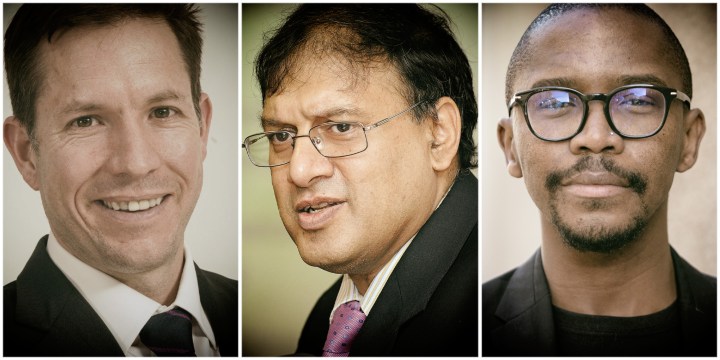DAILY MAVERICK WEBINAR
State Capture could be the nail in SA’s greylisting coffin, experts agree

The threat of greylisting looms early next year, with South Africa needing to show it is serious about stopping the flow of dirty money and terrorist financing. The Financial Action Task Force will decide in early 2023 whether measures that South Africa puts in place by then will be sufficient to avoid a greylisting.
Although South Africa has historically received global praise for the sophistication of its financial and banking system, State Capture has laid bare its deficiencies, highlighting how easy it was for dirty money to move through the South African financial system.
In a recent Daily Maverick webinar, Business Maverick journalist Ray Mahlaka speaking to two experts – Dr Stuart Theobald, co-founder and executive chairman of research consulting firm Intellidex, and Ismail Momoniat, acting director-general at National Treasury unpacked these deficiencies which place the country at risk of greylisting and what that would mean for the economy.
Momoniat says the Zondo Commission and affidavits from the various banks were very informative. However, he questioned what took the banks so long to close the Gupta accounts.
“The banks may say they were filing reports highlighting suspicious transactions, and what were the authorities doing? I think that’s where the big weakness was. If banks were acting and did file suspicious transaction records, the authorities looked the other way, essentially,” he says.
Momoniat adds that the South African system of fighting crime has been quite “naïve”.
“The big issue is that we are so naïve … we are suckers almost when it comes to dealing with highly organised criminal syndicates. When you look at State Capture and the Guptas, I think there were many red flags.
“The bigger issue is that we need to get the entire ecosystem to see the need for increased vigilance and quicker action. Everyone, from the banks to the authorities, should have moved faster,” he says.
Last year, Momoniat warned that South Africa was in danger of becoming a “mafia state” if anti-money laundering laws were not tightened.
The Financial Action Task Force (FATF) is a global monitor for anti-money laundering initiatives, given that it is a global activity. Since the September 2011 attacks in New York, the FATF also focuses on terrorist financing. It works with peer reviews, looking at how countries comply with its 14 key recommendations.
Visit Daily Maverick’s home page for more news, analysis and investigations
South Africa, however, did not fare well in its latest peer review, falling short and complying with only half of the recommendations.
If the country is perceived to be slow and unwilling to take the required actions, Intellidex estimates that the economic impact could be up to 3% of GDP lost from higher costs to international transactions over a five-year period.
However, Theobald says measures have accelerated in the last three months, with government pressing fast-forward on the signing of the Anti-Money Laundering and Combating Terrorism Financing Amendment Bill and the Protection of Constitutional Democracy Against Terrorist and Related Activities Amendment Bill into law.
“The challenge is the effectiveness. The FATF is looking for successful implementation of these laws. That means successful prosecutions and people going to jail.
“The National Prosecuting Authority has done a great job recently with 29 active cases related to State Capture, but we would be better off walking into that February assessment with successful convictions and people sitting in jail,” he says.
Other legal measurements in the pipeline include the proposal for a national register to identify the beneficiaries of trusts. Momoniat says there is a path to prevent greylisting and he remains hopeful.
“Most countries have three to five years to get their systems in place. Implementation is the biggest problem we face. Outcome measures include prosecutions, arrests and asset forfeiture. If we can demonstrate commitment and progress on each of the 11 measures, I’m hoping the FATF will say that’s enough,” he says.
What will a greylisting mean in practical terms?
“FATF members are the biggest economies of the world. A greylisting means that when it comes to trading with those economies, those countries will be applying an enhanced or greater due diligence. That can mean that foreign institutions can refuse to do business with South African companies.
“It could mean that a more invasive due diligence process could be applied, with more demands for information, adding transaction costs,” Theobald says.
Countries that have been greylisted include Turkey, the Cayman Islands, Mali, Morocco and the Philippines.
“The difference is that South Africa is one of the most sophisticated financial economies to face this, to the extent of our capital market and our integration with the global economy. So, it’s unprecedented in terms of how the world will react if we are greylisted,” he says.
The negative reputation effect would be the perception that South Africa is not up to scratch when it comes to monitoring money laundering and terrorist financing with a reduced appetite to do business with South Africa.
“Regulations in the European Union and the United Kingdom mean that all their financial institutions would immediately have to apply enhanced due diligence.
“You might find, for example, that banks in those jurisdictions will refuse to accept incoming transfers from South Africa,” Theobald says. BM/DM


















 Become an Insider
Become an Insider
Hard to believe that banks are naive – more like wilful blindness and keeping their eyes on the balance sheets and not caring about corruption.